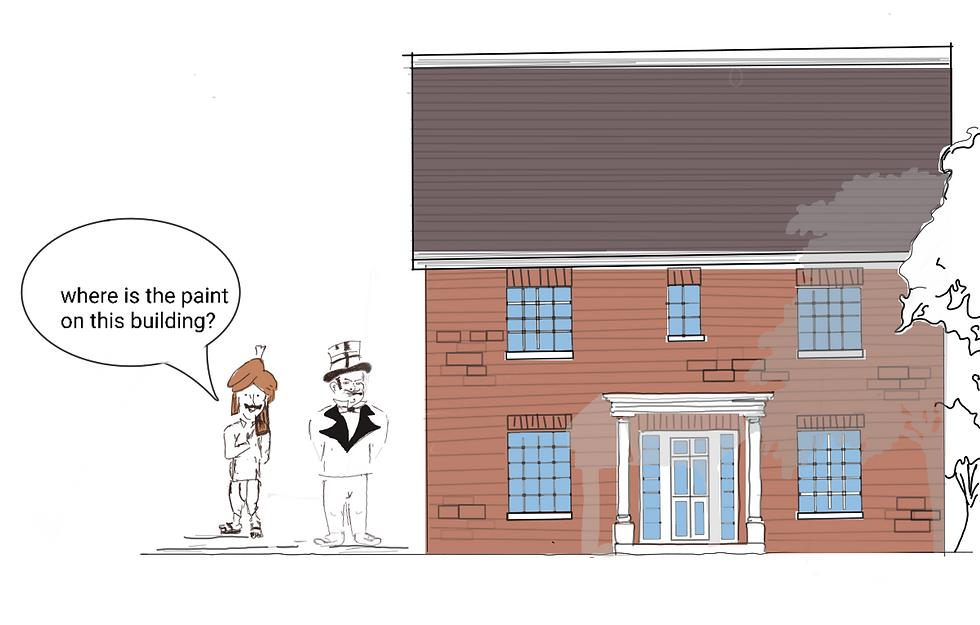Masters in the UK
- Swati Nair
- Dec 17, 2021
- 7 min read
Updated: Jan 15, 2022
Following questions about pursuing a master's degree in the UK as often as once a week, I decided to write about it to help anyone who is thinking of pursuing further studies, moving abroad, or taking up my course in specific.
I have subdivided the topics into separate questions that people mostly enquire about in the hopes that this information will help you make your next big move!
What is the process of application like, and which university should I apply to?
How much is the overall cost including the process and living expenses?
How do I find the right accommodation? Should I go to a student hall or a private accommodation?
How is Nottingham Trent University, and Nottingham as a city?
What is your opinion on the intensity of the course, MA in Interior Architecture and Design at NTU?
The BIG question: What is the prospective of a job opportunity in the UK?
P.S. Don't miss the * for specific details.
What is the process of application like, and which university should I apply to?
Once you have decided on what course to take up, look up universities that offer it along with their course curriculum, infrastructure, and overall specifics that align with your needs and budget. Look at their list of alumni to get a basic understanding of what your opportunities look like.
Get in touch with an academic advisor who might suggest other universities that weren’t on your list to gather a general understanding of the application process.*
To give you a general idea of the application process for an architecture course:
Start filling in your details and uploading documents (marks cards, IELTS, reference letters, portfolio, sponsor letter- loan or parent’s financial support, bank statements) on the university website or partner portal. (starting this process will make you aware of the documents you need to keep in hand to put in your application)
Write a statement of purpose that is specific to the university and course you will be applying to.
Present a minimum of three reference letters preferably two professional and one academic.
For architecture or art and design course, you will have to present a portfolio of works.*
Submit your application and pay the fee once you’re happy with your application.
*I took assistance from a private academic advisor whose contact details are shared below:
Prof. Uma Aswani :
Mobile - +91 98450 23165
Email: uma@umaaswani.com
(refer 'Swati's blog post on studying abroad' when contacting Prof. Uma Aswani)
*Refer university examples of portfolios to match their expectations, and do your research by referring to some of their own latest student work or get in touch with them directly to request a link to the latest undergraduate/postgraduate exhibition work.
Do I need to take up IELTS (International English Language Testing System) and how do I pass this examination?
Each university would have its criteria, however, there would be a minimum passing mark that will qualify you which is fairly easy to pass especially if you come from an English medium school.*
If you have attained a minimum score of 85/100 in your 12th-grade board examination, presenting the marks card exempts you from taking up an IELTS examination. Although you would need to cross-reference whether the examination board is on the list of recognized schools by the university.
*Unfortunately, I won’t be able to answer specific questions in regards to the IELTS exam as I was exempted from writing it. It is not as easy as depicted above, although it's an attempt at easing your stress for now.
How much is the overall cost including the process and living expenses?
For the process, add expenses that you can retrieve online for the application process (per university), course fee, visa application, immigration health surcharge, transportation(flight to London, cab/bus/train to University)*, IELTS exam, further documents like passport, etc.
Living expenses depend on the type of accommodation you go for which is the biggest chunk of your overall living cost. Generally, a private accommodation will cost you a minimum of 800£ a month and sharing that will divide the expenses in half.
Apart from the above, you will spend approximately 100£-150£ a month for food, leisure activities, transportation, studio materials depending on how you budget.
There are several opportunities to work part-time jobs to make up for those expenses considering you’re able to prioritize your time.*
*Try to book your flight directly with the airline service for a flexible ticket and ease in the cancellation process. The university might provide a bus pick-up service from the airport if you book it well in advance. If not, traveling by bus will work out cheaper than a train. Follow the link to book a bus ticket: https://www.nationalexpress.com/en Follow the link to book a train ticket: https://www.thetrainline.com/ *I suggest not getting carried away by the thought of paying off your living expenses and student loans by doing part-time jobs as you will forgo your initial agenda of moving abroad to study and gain experience in the field you are interested in to eventually find a job in the same field. Attend seminars, take part in extracurriculars, do some volunteer work, and enjoy the nightclubs as this may be some of your final years in university where you get to try anything and everything.
How do I find the right accommodation? Should I go to a student hall or a private accommodation?
Type “Student Accommodations in __(Place)___” and you will get numerous options on Google. Refer to the websites, list out and compare them using the filter in accordance to your preference, be it private, shared, mature student halls, etc.
You can book online viewings or ask people you know who are currently studying there, although nothing beats living and seeing it in person if you’re at the liberty to travel in advance to see and book it for yourself. Doing this may have its risk of losing out on the one student hall that you liked as most of them do book them well in advance fearing the same.
Going for a student hall or a private accommodation is your personal choice to make and being utterly confused about it will leave you frustrated.*
*I suggest not overthinking it and logically noting down your expectations and using them to filter out options. I moved 5 times over 2 years to find a place to my liking, although every place taught me something new and there’s nothing more you can ask of an experience.
How is Nottingham Trent University, and Nottingham as a city?
Looking back, I can say that I loved every moment that I even hated at the time.
It was a life-altering journey that opened up new avenues, opportunities, and interests and shaped me into the goal-oriented and determined individual that I am today. Nottingham Trent’s infrastructure, curriculum, material supply, library and workshop facilities, friendly and supportive tutors, and staff were all new and inspiring to me as a designer; which the Indian education system failed me as an academic.
Nottingham is a quaint town compared to the city of London, although it’s rather thriving and close-knitted for its student population concentrated within the city center. It’s also situated centrally allowing one to explore different cities in England within a 3-4 hour radius.
To each their own, but I loved every aspect of Nottingham as it taught me major life skills, instilled confidence, independence, and a vast perspective on living in harmony with a diverse culture. Overall, I feel like I found myself in a foreign land.
What is your opinion on the intensity of the course, MA in Interior Architecture and Design at NTU?
Firstly, this is NOT an Interior Design course; it is mainly catered to adaptive reuse and an extension of architecture into the interior with inbuilt furniture fixtures, external and internal material palette, designing to maximize the usage of natural light, environment and site context, etc.
The course will comprise of three modules, and each module will cover two to three different subjects that include design communication, design studio, research methods, technical study, and a thesis. They are split into three terms starting from September of every year and are separated by the Christmas break and Easter break.
The projects were rather small-scale and expected to be highly detailed to encourage an understanding of design and detailing. The typology of projects within my curriculum included the rebranding of a coffee shop, timber holiday cabin, and a barn conversion.
The studio comprised of a class of 30-40 and the majority were international from all over the world. The class was supported by a staff of four tutors wherein one-to-one sessions took place every other day.
Postgraduate courses are mostly research-based with a lot of self-study and are graded based on how much research you use to execute your thought process.*
This course is not accredited to ARB.*
*I do wish my undergraduate course encouraged this type of learning which would have instilled interest and prepared me to utilize my time better when I pursued my masters. Also, study to learn rather than chasing marks; take the liberty to do thorough research, ask questions, take assistance and utilize their resources to the fullest as you will never receive an abundance of time and resources all plated on one platform thereafter. *You can take up job opportunities within the architecture field, although you will not be entitled to use the title of an Architect unless you sit through ARB’s prescribed examinations to qualify.
The BIG question: What is the prospective of a job opportunity in the UK?
As you may already know, the post-study work visa opens up more opportunities to current applicants, and I would suggest taking up an internship position if you’re struggling to find a job, regardless of how much experience you already have if you wish to work in the UK.*
Use your university portal to find internship opportunities, and consult the employability team to have a look at your resume to gather an overview of the expectations from your industry.
As an international, your position can be easily filled by a local who doesn’t need additional documentation to be employed, and therefore;
"Provide and prove your worth to be promoted."
The sponsorship process is entirely different, and if you have hopefully found the right place that encourages and promotes your services, you can quite easily expect them to hire you as a sponsored employee or move to a different job with the work experience you have gathered.*
For Tier 2 work opportunities, look through the list of registered licensed sponsors to find vacancies and send in your job application: https://www.gov.uk/government/publications/register-of-licensed-sponsors-workers
Keep trying till you can and return happy knowing that you tried. Don’t forget to appreciate the experience you had gathered so far and use it to climb a different ladder of hope.*
*Unfortunately, I can’t provide further information on the post-study work visa as I did not qualify within this category when I graduated. *Stay tuned for a blog post on the Tier-2 sponsorship process. *I take note of my experiences on a personal diary to iterate on my experiences, feel grateful and move on to new hopes and dreams whilst fighting for my ultimate goal.
That’s a wrap!
I hope I have covered a majority of the topics I usually get asked about. If I have missed out on anything, please don’t hesitate to get in touch with me.
© 2021 Swati Nair All rights reserved



Comments